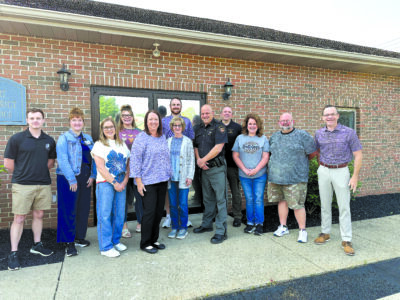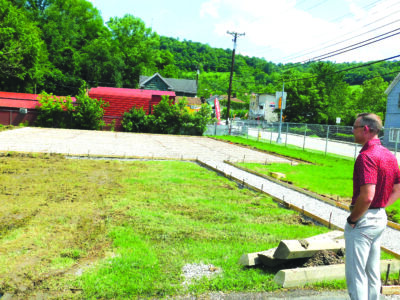Health Experts: Most don’t need to wear masks

Photo Provided Patty Phillips, a squad captain with Smith Township Volunteer Fire Department, tries on a mask she made at home. Many local residents are making masks for themselves, for first responders and for medical personnel in an effort to guard against the coronavirus.
MARTINS FERRY — The federal government says it is in the process of getting more masks into the hands of medical workers, but the average person may be wondering whether they should be wearing a mask at this time because of the coronavirus.
According to the World Health Organization, only those taking care of the ill or who have a cough themselves should be wearing a mask to prevent getting the coronavirus or spreading the germs, respectively.
“If you are healthy, you only need to wear a mask if you are taking care of a person with suspected 2019-nCoV infection,” the WHO notes. “Wear a mask if you are coughing or sneezing. Masks are effective only when used in combination with frequent hand-cleaning with alcohol-based hand rub or soap and water.”
But if one does not have a mask or cannot find any to purchase, some may resort to making their own masks from different materials. According to the Centers for Disease Control and Prevention, in a health care setting, if a regular facemask is not available, homemade masks, such as a bandana or scarf, should only be used as last resort when caring for patients with coronavirus.
“However, homemade masks are not considered (personal protective equipment), since their capability to protect (a health care provider) is unknown. Caution should be exercised when considering this option,” according to the CDC. “Homemade masks should ideally be used in combination with a face shield that covers the entire front (that extends to the chin or below) and sides of the face.”
Rich Lucas, environmental director for the Belmont County Health Department, said the best measure people can take to protect themselves and their loved ones is to practice social distancing, which mean staying at least 6 feet from others.
“And if they choose to wear a mask when getting essential supplies that would be their choice. I do recommend that the public keep hand sanitizer on them when going out to get essential supplies and use the hand sanitizer after touching door handles and other fomites,” Lucas said. “The virus is thought to spread mainly from person-to-person. Between people who are in close contact with one another (within about 6 feet).”
A fomite is an object or material that can carry infectious germs.
“Through respiratory droplets produced when an infected person coughs or sneezes. These droplets can land in the mouths or noses of people who are nearby or possibly be inhaled into the lungs, this is why people should practice the social distance,” Lucas said.
Debbie Cooey, president of the Episcopal Church Women at St. Luke’s Episcopal Church in Wheeling, organized a group of seamstresses to produce cloth masks for health care workers to use during the current COVID-19 pandemic. The group includes members of St. Luke’s and Lawrencefield Parish Church in Wheeling.
On social media, numerous people are giving each other tips on how to make homemade masks for themselves or for donation to health care workers.





